Qataris are active on social media but users are constantly cautioned not to violate the country's laws lest they run afoul of authorities.
"Twitter is a tremendous means of communication, if it's used properly; I always focus on positive issues, participate in positive campaigns and hashtags, and constantly interact with followers through them," said TV presenter Asmaa Al Hamadi.
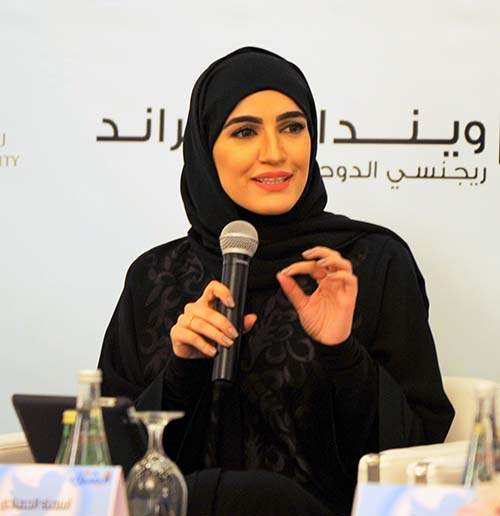 Qatari TV presenter Asmaa Al Hamadi (courtesy Al Sharq)
Qatari TV presenter Asmaa Al Hamadi (courtesy Al Sharq)
However, personal accounts don't always meet credibility standards since what tweeps publish -- except for official news that's tweeted or retweeted -- is a reflection of personal views, she added.
That creates its own set of problems when views or online actions violate privacy, foster hate speech, disseminate rumors, foment internecine and sectarian conflicts, and undermine conservative societies.
Al Hamadi was one of several Qatari and Arab speakers who shed light on such problems, while focusing on ethics and how to counter social media's negative impact at the "Third Tweeps Meet" in Doha organized by the daily Al Sharq.
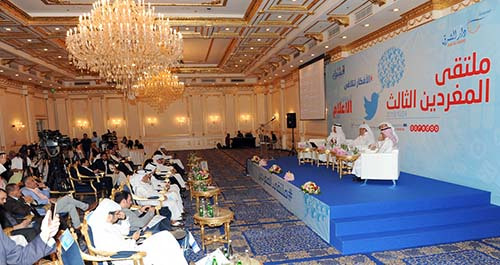 Third Tweeps Meet in Doha (courtesy Al Sharq)
Third Tweeps Meet in Doha (courtesy Al Sharq)
Former Kuwaiti information minister and publisher Saad Al Ajmi described tweeting as a double-edged sword, noting that having the largest number of followers doesn't necessarily make users the most effective tweeps.
"Twitter has created a new speedy culture and provided people a space to express their views, and, achieve three goals: information, communication and pleasure," he said. "I don't think there's a print or broadcast medium that doesn't have a Twitter account."
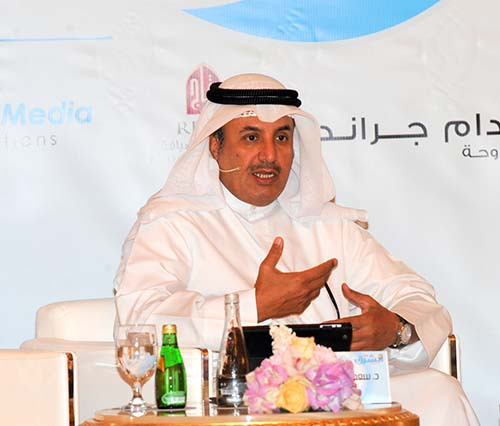 Former Kuwaiti information minister Saad Al Ajmi (courtesy Al Sharq)
Former Kuwaiti information minister Saad Al Ajmi (courtesy Al Sharq)
To Al Ajmi, Twitter has had an impact on Arabic, a rich language that lends itself to lengthy prose and rhetoric.
"Twitter has had a noticeable effect on Arab culture: limiting oneself to 140 characters in a tweet deprives us of stretching and explaining, which is typical Arabic style," he said.
But Twitter has also contributed to the protection of Arabic letters and of the language because it has replaced digital writing, he elaborated, while it's also exposed countless PhDs who are incapable of writing it properly.
Jamal Khashoggi, the Saudi director general of Al Arab satellite news channel owned by Prince Alwaleed bin Talal, saw sinister uses of social media.
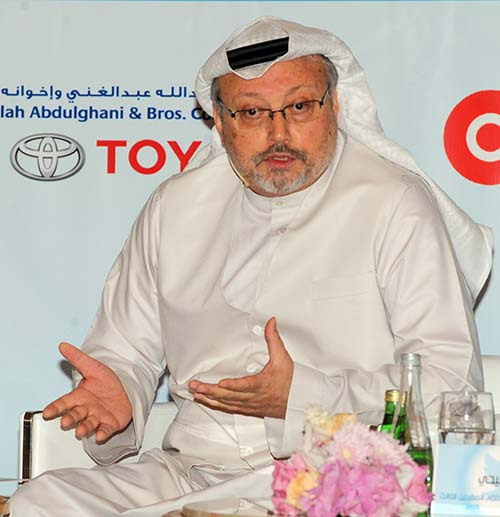 Saudi media figure Jamal Khashoggi (courtesy Al Sharq)
Saudi media figure Jamal Khashoggi (courtesy Al Sharq)
He warned against electronic armies or cells he equated with bacteria and germs that weakened Twitter.
"The electronic cells group five or six individuals with social media experience who set up 100-200 accounts on one of the social media, create a virtual world, and launch specific campaigns that may or may not be good and that are mostly run by political or military entities using mechanisms for premeditated assaults by paid individuals," he charged.
Khashoggi also said repeated lies and claims on Twitter by these cells become reality, prompting governments or institutions to reply and deny what is published and is untrue.
Jaber Al-Harmi, Al Sharq's editor in chief, said the Twitter confab provided a media platform for all to engage in a free discussion as part of its ongoing dedication to social responsibility.
Ethics and how to keep offending content in check are a recurring issue Arab Gulf states take very seriously and that detractors say is an impingement on their personal freedom.
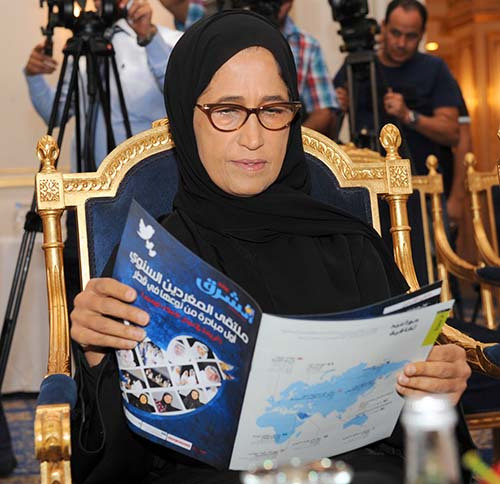
Qatari ICT Minister Hissah Al Jaber (courtesy Al Sharq)
There are ample examples of what turns off print and online content consumers.
On October 25, a horrific crash in Qatar involving a fuel-laden truck and a four-wheel drive passenger car with two male occupants led to the truck flipping over the vehicle, bursting into flames, and burning the men inside it.
No sooner did the accident occur than voyeuristic passersby shot and uploaded videos onto social media, to the dismay of the dead men's loved ones and in clear violation of the country's laws.
The incident triggered a wave of outrage and calls for bans on videos clips related to peoples' personal lives as well as for slapping fines on "anyone who interferes in individuals' privacy, notably traffic accidents, given the physical and psychological impact on the bereaved families," reported Al Sharq.
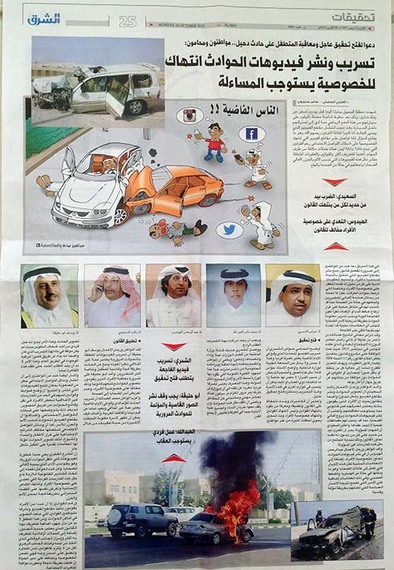 Report on filmed accident uploaded to social media (Abu-Fadil)
Report on filmed accident uploaded to social media (Abu-Fadil)
In September the Qatari cabinet approved amendments to existing legislation that would penalize anyone shooting or disseminating photos of injured or dead people without the consent of the deceased's representatives.
Our 2024 Coverage Needs You
It's Another Trump-Biden Showdown — And We Need Your Help
The Future Of Democracy Is At Stake
Our 2024 Coverage Needs You
Your Loyalty Means The World To Us
As Americans head to the polls in 2024, the very future of our country is at stake. At HuffPost, we believe that a free press is critical to creating well-informed voters. That's why our journalism is free for everyone, even though other newsrooms retreat behind expensive paywalls.
Our journalists will continue to cover the twists and turns during this historic presidential election. With your help, we'll bring you hard-hitting investigations, well-researched analysis and timely takes you can't find elsewhere. Reporting in this current political climate is a responsibility we do not take lightly, and we thank you for your support.
Contribute as little as $2 to keep our news free for all.
Can't afford to donate? Support HuffPost by creating a free account and log in while you read.
The 2024 election is heating up, and women's rights, health care, voting rights, and the very future of democracy are all at stake. Donald Trump will face Joe Biden in the most consequential vote of our time. And HuffPost will be there, covering every twist and turn. America's future hangs in the balance. Would you consider contributing to support our journalism and keep it free for all during this critical season?
HuffPost believes news should be accessible to everyone, regardless of their ability to pay for it. We rely on readers like you to help fund our work. Any contribution you can make — even as little as $2 — goes directly toward supporting the impactful journalism that we will continue to produce this year. Thank you for being part of our story.
Can't afford to donate? Support HuffPost by creating a free account and log in while you read.
It's official: Donald Trump will face Joe Biden this fall in the presidential election. As we face the most consequential presidential election of our time, HuffPost is committed to bringing you up-to-date, accurate news about the 2024 race. While other outlets have retreated behind paywalls, you can trust our news will stay free.
But we can't do it without your help. Reader funding is one of the key ways we support our newsroom. Would you consider making a donation to help fund our news during this critical time? Your contributions are vital to supporting a free press.
Contribute as little as $2 to keep our journalism free and accessible to all.
Can't afford to donate? Support HuffPost by creating a free account and log in while you read.
As Americans head to the polls in 2024, the very future of our country is at stake. At HuffPost, we believe that a free press is critical to creating well-informed voters. That's why our journalism is free for everyone, even though other newsrooms retreat behind expensive paywalls.
Our journalists will continue to cover the twists and turns during this historic presidential election. With your help, we'll bring you hard-hitting investigations, well-researched analysis and timely takes you can't find elsewhere. Reporting in this current political climate is a responsibility we do not take lightly, and we thank you for your support.
Contribute as little as $2 to keep our news free for all.
Can't afford to donate? Support HuffPost by creating a free account and log in while you read.
Dear HuffPost Reader
Thank you for your past contribution to HuffPost. We are sincerely grateful for readers like you who help us ensure that we can keep our journalism free for everyone.
The stakes are high this year, and our 2024 coverage could use continued support. Would you consider becoming a regular HuffPost contributor?
Dear HuffPost Reader
Thank you for your past contribution to HuffPost. We are sincerely grateful for readers like you who help us ensure that we can keep our journalism free for everyone.
The stakes are high this year, and our 2024 coverage could use continued support. If circumstances have changed since you last contributed, we hope you'll consider contributing to HuffPost once more.
Already contributed? Log in to hide these messages.






